Biology: Environmental Concentration
Mission of the Environmental Program
The program’s purpose is to exercise and inspire wise stewardship of Creation through research, education, outreach, and practice. Covenant’s undergraduate program in environmental science is designed to develop student’s abilities to pursue careers as wise stewards of God’s creation, as advocates for creation care, and practitioners in the fields of conservation, restoration, and ecology. For specific examples of what this might look like for you, see below: (What can I do with a Biology Degree with a concentration in environmental science? and Graduate Spotlights).
Students in our program learn to apply wise management to restore ecosystems that function both to provide for our own and future generations (sustainability) and to glorify God in their inherent beauty and diversity (stewardship).
Our program serves as a hub for ecological research on Lookout Mountain, a resource to our neighbors regarding land stewardship, and provides service to conservation organizations in the form of student internships and volunteers.
Table of Contents
- Why study the environment?
- What does a 4-year degree in Environmental Science look like?
- What can I do with a Biology Degree with a concentration in Environmental Science?
- Are there opportunities for students to perform research?
- Are there internships available?
- Graduate Spotlights
- Au Sable Spotlight
- Covenant Summer Institute for Highschool Students
Why study the environment?
Or more clearly, what does it mean to truly pursue the College motto (“In all Things Christ Preeminent”) in the discipline of environmental biology? In a recent review of the past 20 years of environmental policy (ranging from ocean plastic, to deforestation, to climate change), the most hopeful conclusion that can be drawn is that there is no shortage of problems to solve. Environmental challenges reflect an important and often overlooked consequence of the Fall: that all creation groans (Romans 8:22), and that humanity is complicit in our failure to be wise stewards of the resources we were entrusted with. Christians have both the responsibility and privilege as image-bearers to reflect Christ’s preeminence over His creation, and His desire to see it managed well for His glory.
What does a 4-year biology degree with a concentration in Environmental Science look like?
During the four years of an undergraduate degree in Biology, students in the Environmental Concentration will take a breadth of courses that emphasize the beauty, diversity and function of Earth’s biota at a number of organizational scales. In addition to a robust core curriculum, students take courses in mathematics, physics, chemistry, and general biology to build a foundation in the inner workings of creation. Sophomore year, students take General Ecology, and begin integrating upper-division environmental electives into their course load. These courses are offered at Covenant, and through our partner institution the Au Sable Institute, that consider entire organisms and their relationships to the rest of creation. Through our foreign study program or through our partnership with Au Sable, students have the opportunity to take courses away from Covenant’s campus (Michigan, Washington State, India, Costa Rica, & Ecuador) and interact with Christian scholars from universities throughout North America. See our Au Sable Spotlight for student reports of these experiences.
Also, see the catalog description and course requirements for the Environmental Concentration.
What can I do with a Biology Degree with a concentration in Environmental Science?
There are multiple avenues of employment for students seeking to continue their work in environmental science beyond Covenant. See our graduate spotlights for where some of our graduates are now. The following are some prominent areas where our students seek employment:
- Environmental consulting or government employment: These careers involve the application of federal and state laws governing wildlife and natural resources. Consultants work for engineering or environmental consulting firms to help clients with the permitting process. Government employees carry out environmental permitting programs and manage wildlife and land resources on federal and state lands.
- Research: Many students in environmental science either immediately or after a few years on the job return to the academy for post-graduate degrees. There is no shortage of environmental problems that need solving, and the world of research provides expertise and solutions.
- Teaching: Many environmental biologists teach, either in a K-12 setting, or through citizen science programs, or interpretive centers for local and regional parks.
- Conservation & Advocacy: Environmental scientists are needed to serve in stewardship roles throughout public and private lands. Non-government organizations employ graduates to fill roles such as land stewards,
- Sustainable agriculture & missions: Part of sharing the gospel is meeting people where they are, and in much of the world, subsistence agriculture is a means of reaching otherwise unreachable groups. Students with a background in environmental science have the tools to provide expertise for local farmers while sharing the gospel.
- Natural Resources and Sustainability Industries: We all depend on natural resources for our survival, and a sustainable supply of these resources is a paramount concern for corporations that strive to remain viable in a competitive market. Environmental scientists often work to solve environmental problems caused by industry, and many corporations dedicate entire departments to minimizing the environmental impacts of their business.
Are there opportunities for students to perform research with faculty mentors?
There are multiple opportunities for environmental concentration biology majors to engage in collaborative, interdisciplinary research. The following is an example of an ongoing project in the Garris lab:
Covenant College researchers led by Dr. Heath Garris have partnered with Lula Lake Land Trust to address questions regarding the physiological status and recovery of Eastern Hemlocks (Tsuga canadensis) amidst an ongoing infestation by Hemlock Woolly Adelgid (Adelges tsugae). Hemlocks are an important part of forest ecosystems in the south, providing shade for headwater streams, and cool/moist microclimates for numerous native species. The Adelgid is particularly adept at killing mature Hemlock trees, and this infestation has the potential to fundamentally change forest ecosystems throughout the Eastern US. Fortunately, a variety of control methods have been introduced, the most reliable of which is treatment with systemic insecticides. These insecticides accumulate in plant tissues and provide protection for multiple years. Some insecticides actually affect plant physiology in addition to killing damaging insects, stimulating immune responses that help speed recovery.
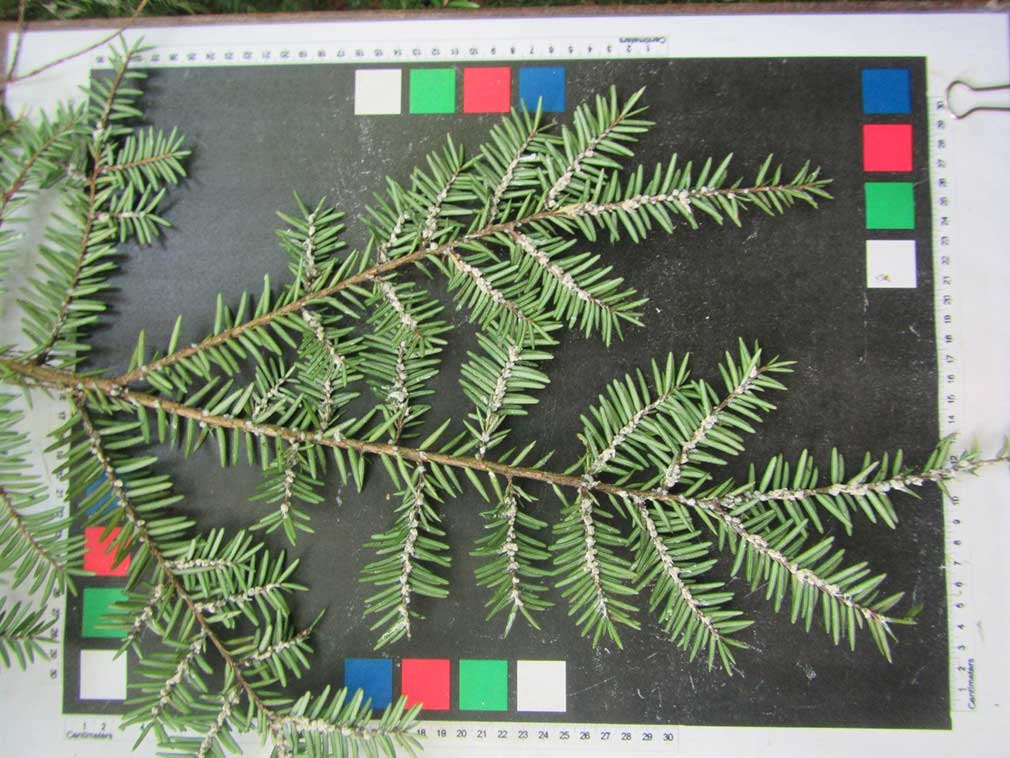
The Covenant research group used reflectance spectroscopy to document the structure and chemistry of leaves from treated and untreated Hemlocks. They found evidence that the systemic insecticide Imidacloprid® alters Hemlock leaf physiology in a manner that is consistent with a beneficial stress response. However, as the pest and the insecticide both appear to stimulate the same stress-response pathway, questions remain as to how the pest is able to overcome plant defenses in the absence of the insecticide.
2019. Garris HW, Settle TH, Crossman JE, Grider SJ, Michaels SL. Combined effects of hemlock woolly adelgid (Adelges tsugae) infestation and treatment with imidacloprid on eastern hemlock (Tsuga canadensis) leaf radiometry. Journal of Forestry 1-11 doi:10.1093/jofore/fvz021.
A second cohort of research students have taken on the challenge of documenting long-term shifts in soil microbial metabolism in response to these insecticide treatments. They are using environmentally- derived DNA (eDNA) to document the composition and metabolic potential of bacteria and fungi in soils from Lula Lake Land Trust. Sequencing is underway with research partners at Thompson Rivers University (BC, Canada).
The research group includes students from two iterations of Covenant’s Research Methods BIO389 & Research in Biology BIO391 courses : Thomas Settle, Jonathan Crossman, Stephen Grider, Shawnte Michaels, Shade Epes, Tyler Epes, and Emily McGarvey.
Are there internships available?
Covenant is uniquely located at the hub of numerous conservation organizations, land trusts, and municiple governments. Every student must complete a practicum or internship as a requirement for the major, and each student works with their academic advisor to select and coordinate an internship that provides valuable work experience and connections to potential avenues of employment. The following is a list of some possible internship partners for environmental concentration majors:
- Lula Lake Land Trust
- Lookout Mountain Conservancy
- Chickamauga & Chattanooga National Military Park
- Cloudland Canyon State Park
- Prentice Cooper National Forest
- The Tennessee Aquarium
- Crabtree Farms
- Eden Thistle Farm
- The City of Lookout Mountain Georgia
- The City of Chattanooga
- The Chattanooga Zoo
- Reflection Riding Arboretum
- The Chattanooga Audubon Society
- The Nature Conservancy
- Georgia Department of Natural Resources
- Tennessee Wildlife Resources Agency
- Tennessee Valley Authority
- Tennessee River Gorge Trust
Graduate Spotlights
Emily McGarvey: Class of 2019
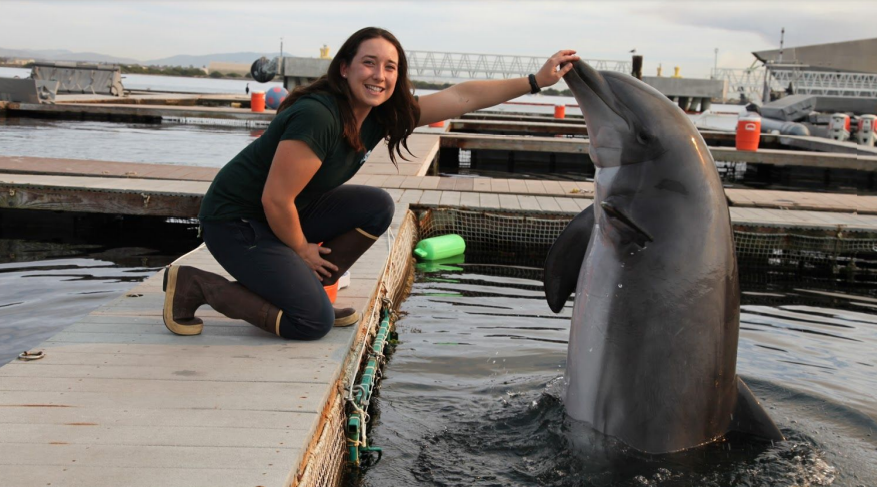
Where are you now, and how did you get there?
I am currently a full-time intern with the US Navy Marine Mammal Program in San Diego, CA. The program works with Atlantic Bottlenose Dolphins (Tursiops truncatus) and California Sea Lions (Zalophus californianus) performing deep sea recovery, waterside security and mine detection work for the armed forces, DOD and other federal and state agencies. Think of it like an underwater canine unit. The program has also done extensive research on marine mammal health, physiology, sensory systems, and behavior. I began my work with the program this past fall as an animal care and training intern learning the basic elements of marine mammal training and husbandry. I am continuing this spring as a research intern with their work on bioacoustic and biologic research. Since graduating from Covenant College, I have worked in several short term and seasonal jobs and internships exploring the field. From interning for conservation non-profit A Rocha UK in London, England as an Environmental Educator to working as a Harvest Machine Driver on a raspberry farm near British Columbia, I have found there are new adventures and opportunities everywhere to learn more about the world and how we as human beings interact, work alongside and care for it as long as you’re willing to work hard and have an open-mind.
How did Covenant (including Au Sable’s) environmental courses prepare you for your current role?
My time at Covenant has equipped me for my current role by training me to think critically and Biblically. Rigorous coursework in the major and deep discussions about life and the intrinsic value of creation, morality, ethics and conservation were all significant contributors to gaining a well-rounded education from Covenant. Dr. Garris goes a long way in making sure you’re prepared for actual work in the field. From introducing you to excel, GIS systems, and multivariate stats, he also takes the time in some upper division courses (whether he’s your advisor or not!) to find out your interests and career aspirations and how you as an individual can best prepare yourself to be a competitive applicant for jobs and grad schools.
What’s one thing you would tell a prospective student who is considering Covenant’s Environmental Program?
I’ll be honest, at first I was hesitant to commit to a Biology major focusing on environmental studies. “It's such a secular field”, I had heard all my life and thought to myself. Well folks, this is the very reason we need people of faith in the environmental sector. The world is starving for hope and we’ll only ever see it through the gospel and the lens of a Creator God who called what he made ‘good’, loves it, is sovereign over it, and has plans to redeem it. “For God so loved the cosmos…” Jn 3:16. While God has a redemption story for each of us, the good news of the gospel is so much bigger than just that. How awesome that we have the opportunity to be a part of proclaiming that good news while getting our hands dirty and participating in work that has such a variety of applications to suit many different personalities.
Bethany Beck: Class of 2018
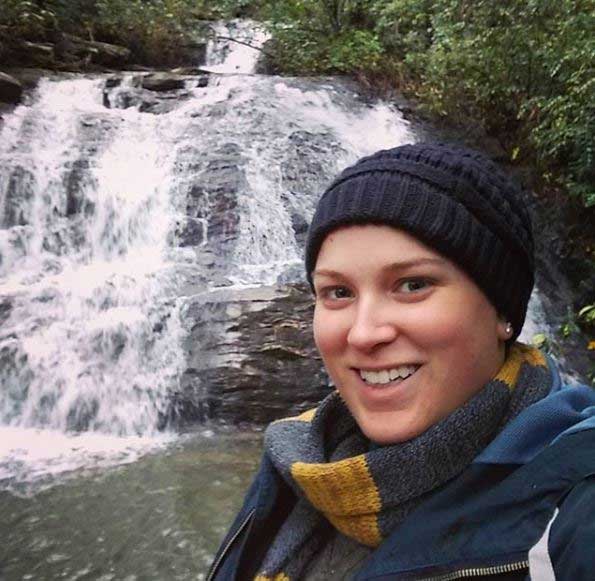
Where are you now, and how did you get there?
I recently began working at Smithgall Woods State Park as a Naturalist. I run interpretive programs for both adults and children. I always knew I wanted a job at a State or National Park, ever since I was a kid. However, it certainly was a rough road to get to where I am now. From working night shifts at an Amazon Warehouse to spending months unemployed applying for anything I could, God planned every minute of my journey. I would not have found this position if it were not for the connections He put in my life, through family and friends. I am very grateful and excited for the career and Calling Christ has for me.
How did Covenant (including Au Sable’s) environmental courses prepare you for your current role?
Both my time at Covenant and at Au Sable taught me how to interpret the natural world. Field Botany taught me that everything has a name and to enjoy the journey of learning them just as Adam enjoyed naming them. Biology Perspectives taught me to question the laws of science and the preconceptions I hold under the God-given curiosity that drives me. And Au Sable taught me not only how to be a better steward myself, but how to be a better example for those around me. All these life lessons come into play daily working at a conservation park and with the public.
What is one thing you would tell a prospective student who is considering Covenant’s Environmental Program?
Covenant will challenge you like nothing you have ever experienced before. You will be unsure if you can make it and you will want to give up but don’t. It is in those moments that you realize your reliance on Christ’s strength. And in the moments after that, you realize there is never anything that Christ’s strength cannot carry you through.
Jonathan Crossman: Class of 2018
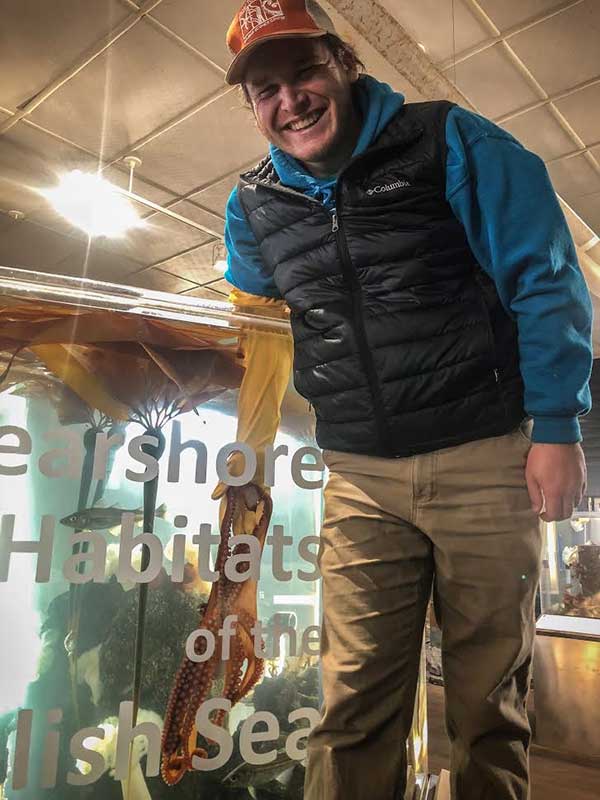
Where are you now, and how did you get there?
I am a research assistant at the Chicago Zoological Society’s Sarasota Dolphin Research Program (SDRP) where I perform photo identification of bottlenose dolphins. I assist with research surveys, rescues, and health assessments. When I graduated college, I moved to Washington state where I worked at Port Townsend Marine Science Center. I helped with the marine mammal stranding network and as an aquarist. After that I interned at SDRP for 6 months learning the ins and outs of population dynamics of nearshore bottlenose dolphins. I worked a brief stint at the Institute of Marine Mammals as a research assistant/stranding tech before returning to Sarasota as a staff member. It is a blessing to work for the longest running dolphin research program in the world who produced groundbreaking work that has been used around the world. Covenant and Au Sable were amazing facilitators in my education. The environmental job market is tough, however, I was fortunate to be able to combine my love for wildlife and photography into one job.
How did Covenant (including Au Sable’s) environmental courses prepare you for your current role?
I have always been environmentally focused and chose Covenant because it allowed me the platform to continue working with current ecological issues, while instilling a Christian mindset. Au Sable was key in bringing classroom knowledge to the field where I could apply techniques established at Covenant. I took marine biology at the Pacific Rim campus and instantly knew that was where I wanted to focus my studies.
What is one thing you would tell a prospective student who is considering Covenant’s Environmental Program?
Covenant’s small teacher to student ratio allows for detailed attention to the student, who is given freedom to focus on particular areas of interest. Dr. Garris is a passionate teacher, eager to instill knowledge and scientific techniques, while giving students the tools to be able to flourish out of college.
Stephen Grider: Class of 2017
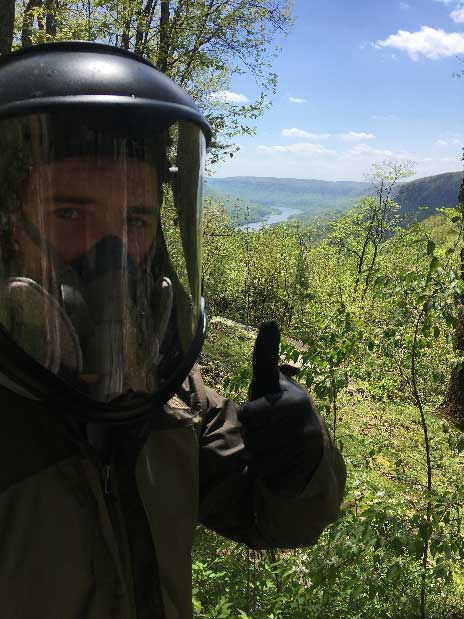
Where are you now, and how did you get there?
After earning my degree in environmental biology from Covenant College, I became a licensed forestry pest technician in the state of Tennessee. During my senior year, I had the opportunity to collaborate with my professor, Dr. Garris, on a research project with the Hemlock Wooly Adelgid—an invasive forest pest in our area. This experience led me to take the knowledge that I had learned, and turn it into practice. Now, I have become one of the most experienced foresters in our area.
How did Covenant (including Au Sable’s) environmental courses prepare you for your current role?
Covenant College prepared me in many ways for this career. Perhaps the most important lesson I learned during my time at Covenant was to think holistically. Science is not a one-dimensional machine, and it takes a well-rounded person to in essence ‘do science’. The environmental program, and its partnering institute, Au Sable, taught me how to ‘do science’ as a whole; that is, to observe, to hypothesis, to experiment, to record, to theorize, and to know God’s presence in all of it.
What is one thing you would tell a prospective student who is considering Covenant’s Environmental Program?
If I had one piece of advice to give someone considering the Environmental program at Covenant College, it would be to know this: it won’t be easy. Be prepared to be tested, pushed, tried, and made into a stronger, more humble servant of Christ.
Au Sable Spotlight
Emily McGarvey ’19 and the Au Sable India Class visit the Akkamalai Grasslands, a UNESCO World Heritage Site, in Tamil Nadu India with Professors Dieter Bouma from the University of Michigan and Dr. A. Relton from the Heber-Au Sable Institute in Tamil Nadu, India. The 3-week immersive Au Sable course, Conservation and Development in the Indian Tropics covered a variety of topics dealing with issues like, human-wildlife conflict, conservation and tribal lands, agriculture, ecotourism, and endangered species protection. All of these topics and more were discussed and observed in the cultural and economic context of South India.
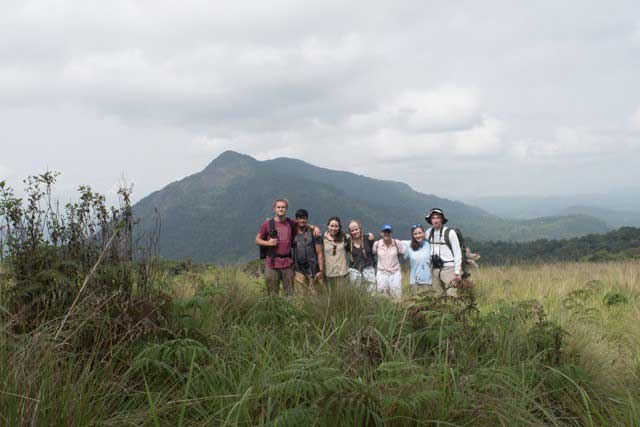
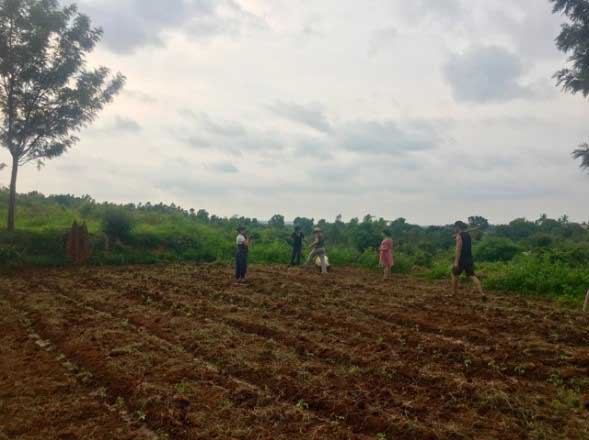
A Mahout and his elephant. While in the Mudumalai Tiger Reserve, the Au Sable India Class had a chance to visit camp elephants still owned by the park and domesticated during the time of the British Raj. This was an opportunity to discuss methods of in-situ and ex-situ conservation in the greater context of the course on Conservation and Development in the Indian Tropics.
Learning about agricultural practices in India by getting their hands dirty. The Au Sable India Class assisted the Marantha Baptist Bible College and Seminary in planting crops that would feed the students for the coming school year. Topics were discussed that addressed the overall theme of the course which was to explore how as Christians we can improve the lives of God’s people and continue to protect His non-human creation.
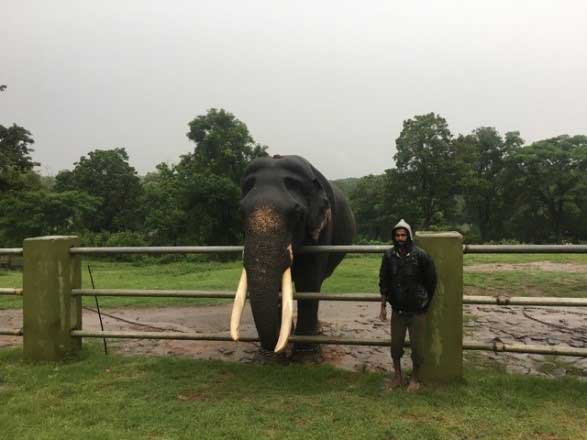
Covenant Summer Institute for Highschool Students
Still not convinced? Join us this summer for a 1-credit course entitled "The Language of Nature" as part of Covenant's 1-week Summer Institute.
Graduate School of Education
Undergraduate Departments, Majors, Minors, Certificates, Concentrations, and Programs
Art
- Art, 2-D Concentration
- Art, 3-D Concentration
- Art, Art History Concentration
- Art, Graphic Design Concentration
- Art, Photography Concentration
- Art minor
- Art History minor
- Arts Administration Minor
Biblical & Theological Studies
- Biblical & Theological Studies
- Biblical & Theological Studies, Missions Concentration
- Biblical & Theological Studies minor
- Biblical Languages minor
- History of Christianity minor
- Missions minor
- Youth Ministry minor
Biology
- Biology, Biomedical Concentration
- Biology, Environmental Concentration
- Biology, General
- Biology, Health Professions Concentration
- Biology minor
- Environmental Stewardship & Sustainability
- Neuroscience minor
Business
- Business
- Business, Accounting Concentration
- Business, Finance Concentration
- Business, Marketing Concentration
- Sport Management
- Business minor
- Sport Management minor
- Entrepreneurship Minor
Chemistry
- Chemistry, Biochemistry Concentration
- Chemistry, General
- Biochemistry minor
- Chemistry minor
Community Development
- Community Development
- Community Development minor
Computer Science
- Computer Science
- Computer Science minor
Economics
- Economics
- Economics minor
Education
- Education Studies
- Elementary Education (P-5)
- Secondary Education Certifications through MAT program
- Education minor
Engineering 3:2 Program
- Natural Science, Pre-Engineering Studies Concentration
English
- English
- English, Writing Concentration
- English minor
- Writing minor
- Journalism and Society minor
Health, Wellness and Coaching
- Coaching minor
History, Politics, and International Studies
- History
- History, Art History Concentration
- Political Science
- International Studies
- History minor
- Political Science minor
Interdisciplinary Studies
- Interdisciplinary Studies with Concentrations
Mathematics
- Mathematics
- Mathematics minor
Music
- Music, Church Music Concentration
- Music, Creative Studies Concentration
- Music, General Music Concentration
- Music, Instrumental Performance Concentration
- Music, Music Education (Pre-MAT) Concentration
- Music, Organ Performance Concentration
- Music, Piano Pedagogy Concentration
- Music, Piano Performance Concentration
- Music, Vocal Performance Concentration
- Music minor
Philosophy
- Philosophy
- Philosophy minor
- Medical Ethics Consultation Minor
Physics
- Physics
- Physics minor
Pre-Professional Programs
- Pre-Law Studies
- Pre-Medical Studies
- Pre-Nursing Studies
- Pre-Physical Therapy Studies
Psychology
- Psychology
- Psychology minor
Sociology
- Sociology
- Sociology, Family Studies & Social Work Concentration
- Sociology minor
Theatre
- Theatre minor
World Languages
- French
- Spanish
- French minor
- Spanish minor
- Teaching English to Speakers of Other Languages (TESOL) Minor
